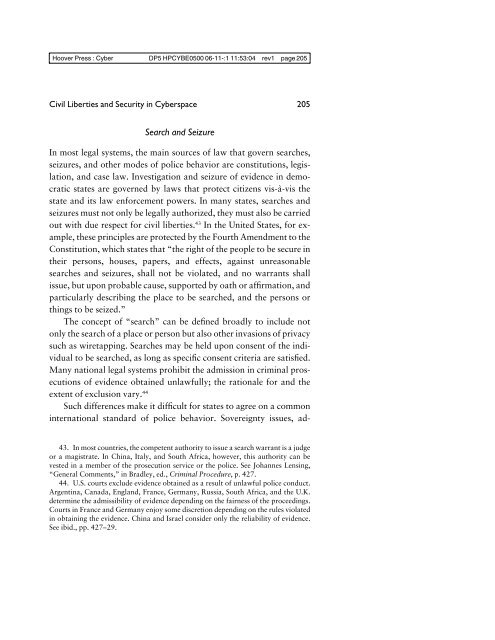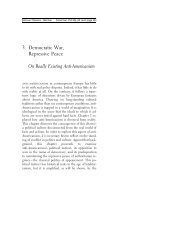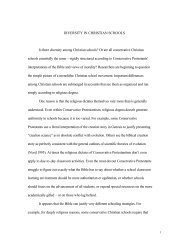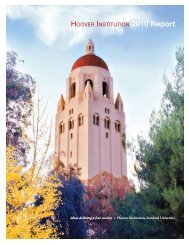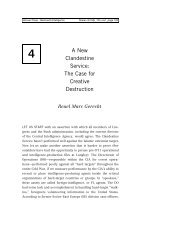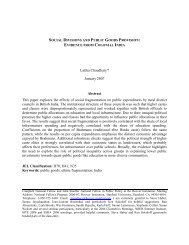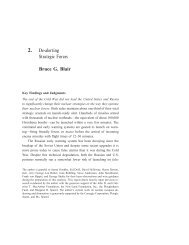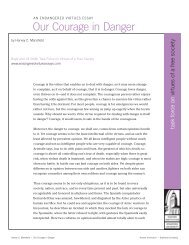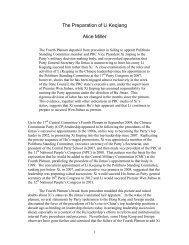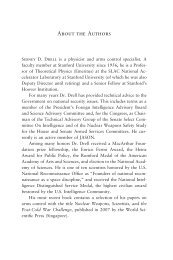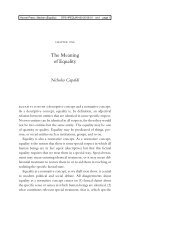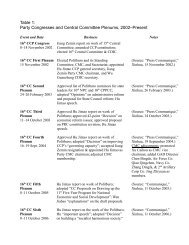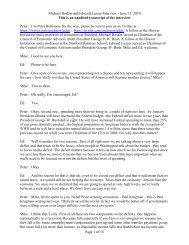Civil Liberties and Security in Cyberspace - Hoover Institution
Civil Liberties and Security in Cyberspace - Hoover Institution
Civil Liberties and Security in Cyberspace - Hoover Institution
Create successful ePaper yourself
Turn your PDF publications into a flip-book with our unique Google optimized e-Paper software.
<strong>Hoover</strong> Press : Cyber DP5 HPCYBE0500 06-11-:1 11:53:04 rev1 page 205<br />
<strong>Civil</strong> <strong>Liberties</strong> <strong>and</strong> <strong>Security</strong> <strong>in</strong> <strong>Cyberspace</strong><br />
Search <strong>and</strong> Seizure<br />
205<br />
In most legal systems, the ma<strong>in</strong> sources of law that govern searches,<br />
seizures, <strong>and</strong> other modes of police behavior are constitutions, legislation,<br />
<strong>and</strong> case law. Investigation <strong>and</strong> seizure of evidence <strong>in</strong> democratic<br />
states are governed by laws that protect citizens vis-à-vis the<br />
state <strong>and</strong> its law enforcement powers. In many states, searches <strong>and</strong><br />
seizures must not only be legally authorized, they must also be carried<br />
out with due respect for civil liberties. 43 In the United States, for example,<br />
these pr<strong>in</strong>ciples are protected by the Fourth Amendment to the<br />
Constitution, which states that “the right of the people to be secure <strong>in</strong><br />
their persons, houses, papers, <strong>and</strong> effects, aga<strong>in</strong>st unreasonable<br />
searches <strong>and</strong> seizures, shall not be violated, <strong>and</strong> no warrants shall<br />
issue, but upon probable cause, supported by oath or affirmation, <strong>and</strong><br />
particularly describ<strong>in</strong>g the place to be searched, <strong>and</strong> the persons or<br />
th<strong>in</strong>gs to be seized.”<br />
The concept of “search” can be def<strong>in</strong>ed broadly to <strong>in</strong>clude not<br />
only the search of a place or person but also other <strong>in</strong>vasions of privacy<br />
such as wiretapp<strong>in</strong>g. Searches may be held upon consent of the <strong>in</strong>dividual<br />
to be searched, as long as specific consent criteria are satisfied.<br />
Many national legal systems prohibit the admission <strong>in</strong> crim<strong>in</strong>al prosecutions<br />
of evidence obta<strong>in</strong>ed unlawfully; the rationale for <strong>and</strong> the<br />
extent of exclusion vary. 44<br />
Such differences make it difficult for states to agree on a common<br />
<strong>in</strong>ternational st<strong>and</strong>ard of police behavior. Sovereignty issues, ad-<br />
43. In most countries, the competent authority to issue a search warrant is a judge<br />
or a magistrate. In Ch<strong>in</strong>a, Italy, <strong>and</strong> South Africa, however, this authority can be<br />
vested <strong>in</strong> a member of the prosecution service or the police. See Johannes Lens<strong>in</strong>g,<br />
“General Comments,” <strong>in</strong> Bradley, ed., Crim<strong>in</strong>al Procedure, p. 427.<br />
44. U.S. courts exclude evidence obta<strong>in</strong>ed as a result of unlawful police conduct.<br />
Argent<strong>in</strong>a, Canada, Engl<strong>and</strong>, France, Germany, Russia, South Africa, <strong>and</strong> the U.K.<br />
determ<strong>in</strong>e the admissibility of evidence depend<strong>in</strong>g on the fairness of the proceed<strong>in</strong>gs.<br />
Courts <strong>in</strong> France <strong>and</strong> Germany enjoy some discretion depend<strong>in</strong>g on the rules violated<br />
<strong>in</strong> obta<strong>in</strong><strong>in</strong>g the evidence. Ch<strong>in</strong>a <strong>and</strong> Israel consider only the reliability of evidence.<br />
See ibid., pp. 427–29.


